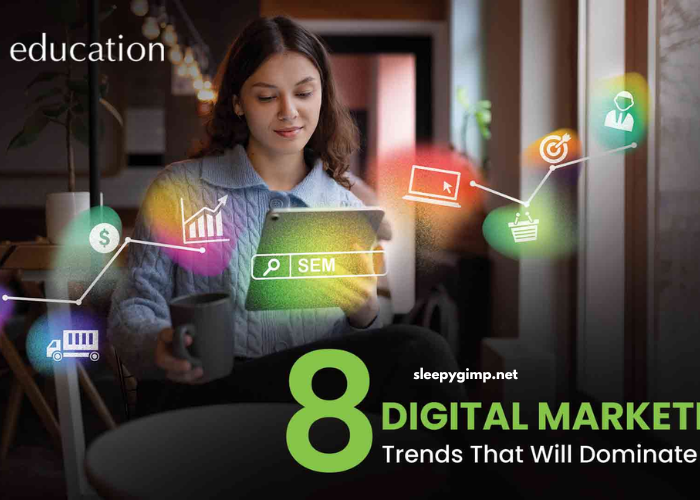In the ever-evolving digital landscape, businesses face increasing pressure to stay ahead of the competition. One of the most effective ways to do this is by adopting the latest digital marketing trends. As technology continues to advance and consumer behavior shifts, keeping up with these changes is crucial to maintaining relevance and visibility in the market. In this article, we’ll explore how you can boost your business with the current digital marketing trends, offering actionable strategies and insights for success.
The Importance of Digital Marketing in Today’s Business World
Digital marketing has become an essential component of any successful business strategy. With the increasing reliance on the internet for information, shopping, and communication, businesses must adapt their marketing techniques to meet the expectations of today’s digitally-savvy consumers. Whether you’re a small business owner or managing a large corporation, digital marketing allows you to reach your target audience effectively and at a lower cost than traditional marketing methods.
Why Businesses Need to Embrace Digital Marketing
- Global Reach: With digital marketing, you can reach audiences across the globe, breaking geographical barriers that limit traditional marketing methods.
- Cost-Effective: Digital marketing methods, such as social media ads or email campaigns, tend to be more affordable compared to traditional advertising avenues like print or television ads.
- Targeted Audience: Digital marketing allows for precise targeting based on user demographics, interests, behaviors, and preferences, making it easier to reach the right audience.
- Measurable Results: Unlike traditional marketing, digital campaigns offer the ability to track real-time data, allowing you to measure success and optimize your strategies accordingly.
- Increased Engagement: Digital platforms provide interactive opportunities, enabling businesses to foster deeper connections with customers.
Key Digital Marketing Trends to Boost Your Business in 2025
As we move through 2025, it’s essential to understand the latest trends in digital marketing that will shape the industry. By leveraging these trends, businesses can stay competitive, enhance customer experiences, and drive growth. Let’s dive into the top digital marketing trends you should focus on.
1. Artificial Intelligence (AI) and Automation
Artificial intelligence is revolutionizing digital marketing by enabling businesses to automate tasks, analyze data more efficiently, and personalize customer interactions.
How AI Can Help Your Business
- Chatbots and Customer Service: AI-driven chatbots provide real-time customer support and guidance, improving customer satisfaction while freeing up valuable time for your team.
- Predictive Analytics: AI-powered tools can predict customer behavior, helping businesses anticipate trends, customize offerings, and optimize marketing strategies.
- Personalized Content: AI enables hyper-personalized marketing by analyzing user data and delivering tailored content or recommendations that resonate with specific customer preferences.
Automation for Efficiency
Marketing automation platforms can help streamline repetitive tasks such as email marketing, social media posting, and customer relationship management (CRM). Automating these processes frees up your time, allowing you to focus on strategy and creative aspects of your business.
2. Voice Search Optimization
The use of voice search has increased significantly, with consumers relying on voice assistants like Siri, Alexa, and Google Assistant to find information online. This shift is reshaping how businesses approach search engine optimization (SEO).
Why Voice Search Matters
- Faster Queries: Voice searches are often more conversational and longer than text-based searches, which can affect the way keywords are selected and integrated into content.
- Local Search Opportunities: Many voice searches are location-based, such as “Where is the nearest coffee shop?” Businesses can take advantage of this by optimizing for local SEO and ensuring their contact details, hours of operation, and addresses are up to date.
Optimizing for Voice Search
To optimize your content for voice search, focus on natural language, question-based queries, and long-tail keywords. You should also prioritize mobile optimization and ensure your website loads quickly, as many voice searches occur on mobile devices.
3. Video Marketing and Live Streaming
Video content remains one of the most effective ways to engage audiences. As more people turn to platforms like YouTube, Instagram, and TikTok, video marketing continues to drive results for businesses.
Why Video Marketing Works
- Higher Engagement: Video content garners more engagement than text or images alone, leading to higher click-through rates, shares, and comments.
- Storytelling: Videos offer a unique way to tell your brand story and convey emotions, making it easier for customers to connect with your message.
Live Streaming for Real-Time Engagement
Live streaming has exploded in popularity, offering brands a unique opportunity to interact with audiences in real time. Whether you’re hosting product launches, behind-the-scenes tours, or Q&A sessions, live streaming enables you to build stronger relationships with your followers.
To make the most of video and live streaming, consider using platforms like Instagram Live, Facebook Live, or YouTube to create engaging content. Additionally, incorporating user-generated content (UGC) in your video strategy can further enhance authenticity and encourage customer participation.
4. Influencer Marketing
Influencer marketing remains a powerful way to promote your business and build brand trust. By partnering with influencers who share your brand values, you can reach a wider audience and increase credibility.
Why Influencer Marketing Is Effective
- Trust and Authority: Influencers have established trust with their followers, and their recommendations carry weight. When an influencer endorses your product or service, their followers are more likely to consider it.
- Targeted Reach: Influencers typically have a niche audience that aligns with specific interests. This makes it easier for businesses to target potential customers who are already interested in similar products or services.
How to Leverage Influencer Marketing
To successfully use influencer marketing, identify influencers in your industry who align with your brand values. Collaborate on authentic campaigns that highlight the unique benefits of your offerings. Micro-influencers, with smaller but highly engaged audiences, can also be an effective choice for businesses with a smaller marketing budget.
5. Social Media Marketing and User-Generated Content (UGC)
Social media platforms remain a dominant force in digital marketing, and businesses that excel at social media marketing tend to have a more engaged customer base.
Why Social Media Matters
- Real-Time Interaction: Social media provides an avenue for businesses to engage directly with customers, answer questions, and resolve issues in real time.
- Brand Awareness: With billions of users on platforms like Facebook, Instagram, and TikTok, social media offers unparalleled reach, making it an essential tool for brand visibility.
Utilizing User-Generated Content
User-generated content (UGC) is one of the most powerful tools businesses can use to build authenticity and trust. UGC includes content created by your customers, such as reviews, photos, videos, or testimonials. Sharing UGC on your own social media channels not only provides social proof but also encourages others to engage with your brand.
6. Augmented Reality (AR) and Virtual Reality (VR)
Augmented reality (AR) and virtual reality (VR) technologies are increasingly being incorporated into digital marketing strategies to enhance customer experiences.
The Role of AR and VR in Marketing
- Virtual Product Trials: AR allows customers to virtually try on products, such as clothing, accessories, or makeup, before making a purchase. This reduces uncertainty and boosts conversion rates.
- Immersive Brand Experiences: VR enables brands to create immersive environments where customers can explore their products or services in a highly interactive and engaging way.
7. Sustainability and Ethical Marketing
Consumers are becoming more conscious of the environmental and social impact of their purchasing decisions. Ethical marketing, which emphasizes sustainability, diversity, and corporate social responsibility, is increasingly important in 2025.
Why Sustainability Is Key
- Consumer Expectations: Modern consumers prefer brands that align with their values, especially in areas like sustainability, eco-friendliness, and ethical business practices.
- Brand Loyalty: By prioritizing sustainability, businesses can foster long-term customer loyalty and improve their reputation in the market.
Conclusion: Staying Ahead with Digital Marketing Trends
In 2025, digital marketing trends will continue to evolve, but one thing remains certain: embracing innovation and staying ahead of the curve is crucial for business success. By incorporating AI, voice search optimization, video marketing, influencer partnerships, social media strategies, AR/VR experiences, and ethical practices into your digital marketing plan, you can boost your business and build lasting relationships with your customers.
Adapting to these trends isn’t just about keeping up with the competition; it’s about creating a meaningful and impactful experience for your customers that drives growth and profitability. Implementing these strategies thoughtfully and strategically will not only elevate your marketing efforts but also pave the way for sustained success in a fast-changing digital world.





